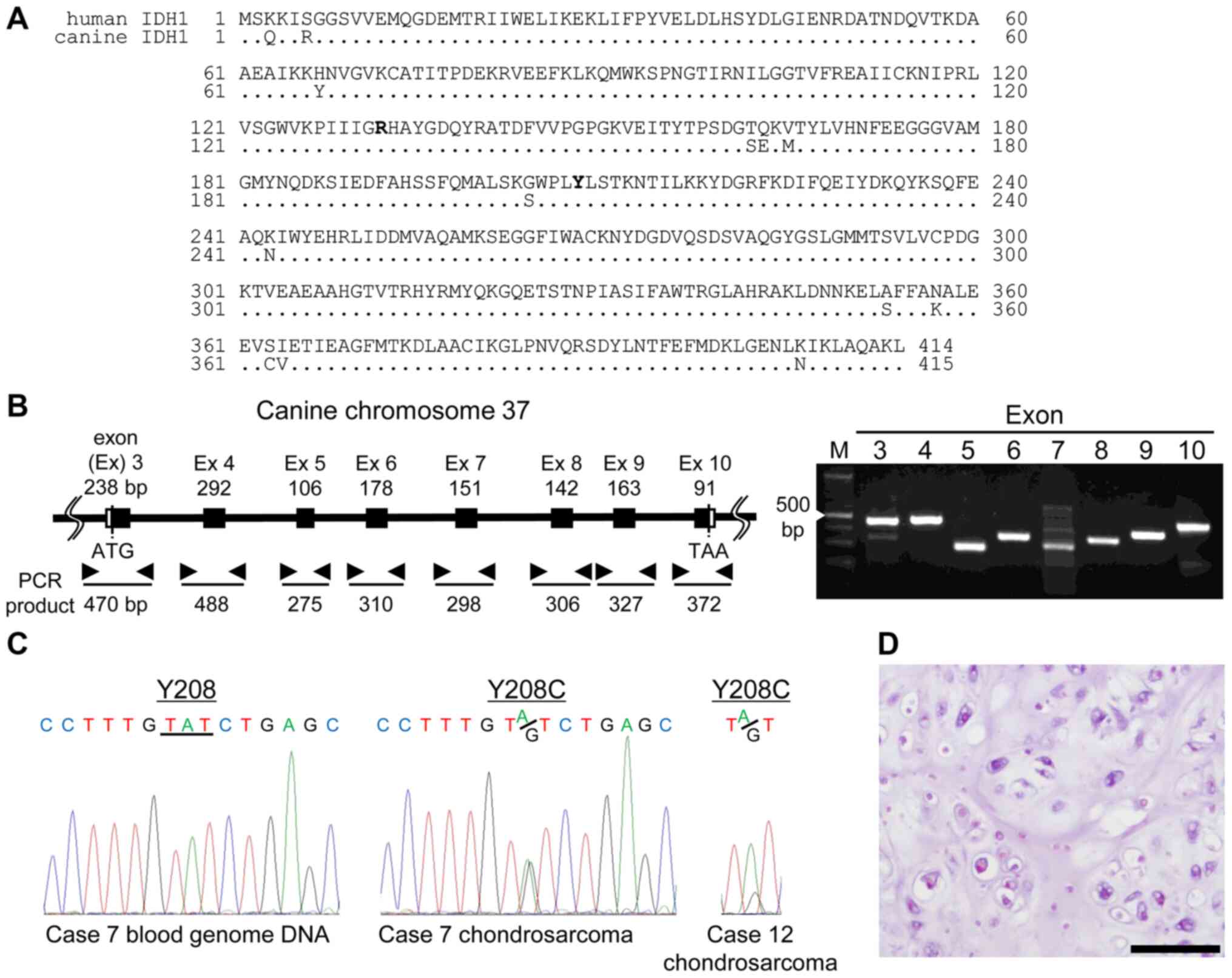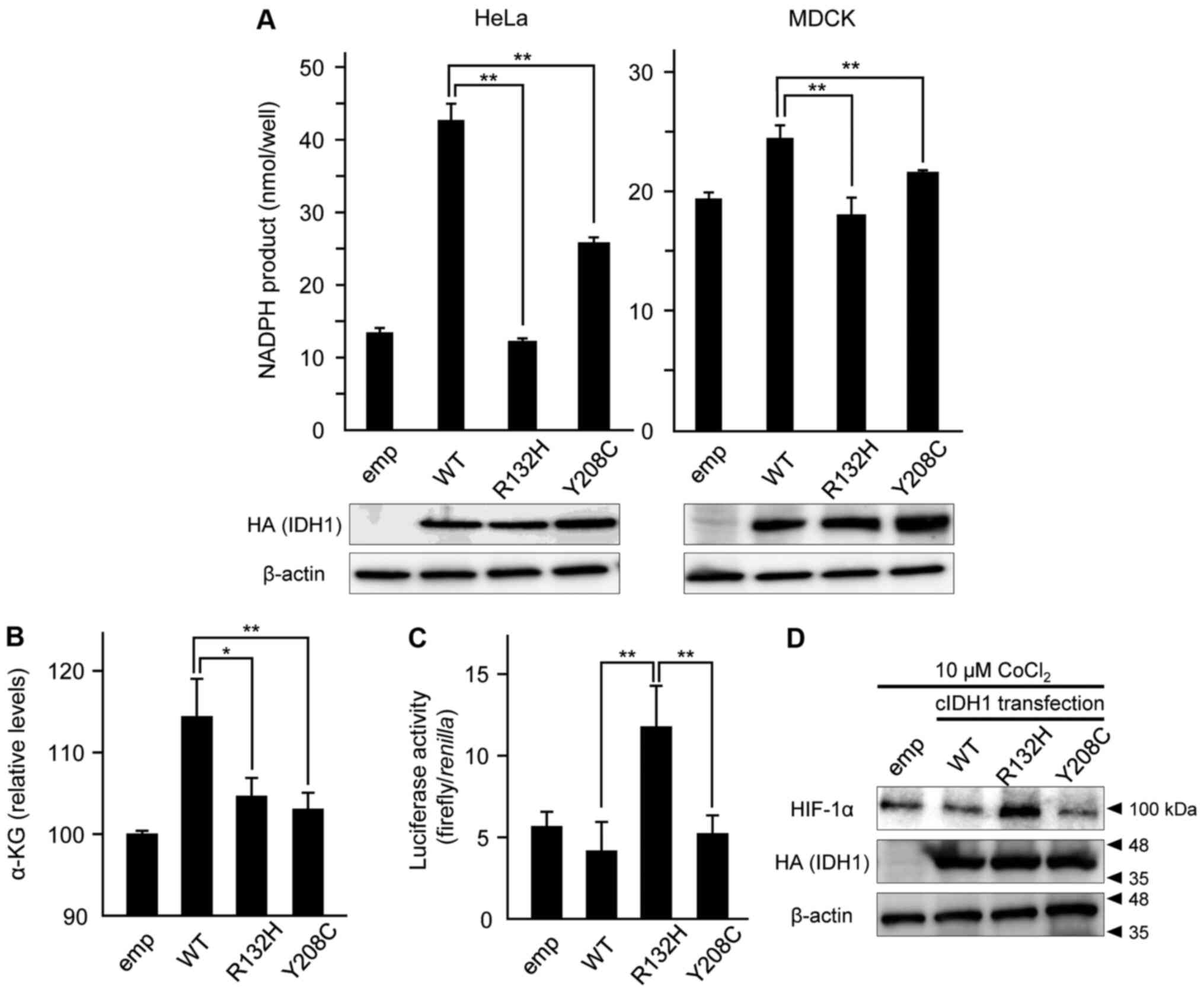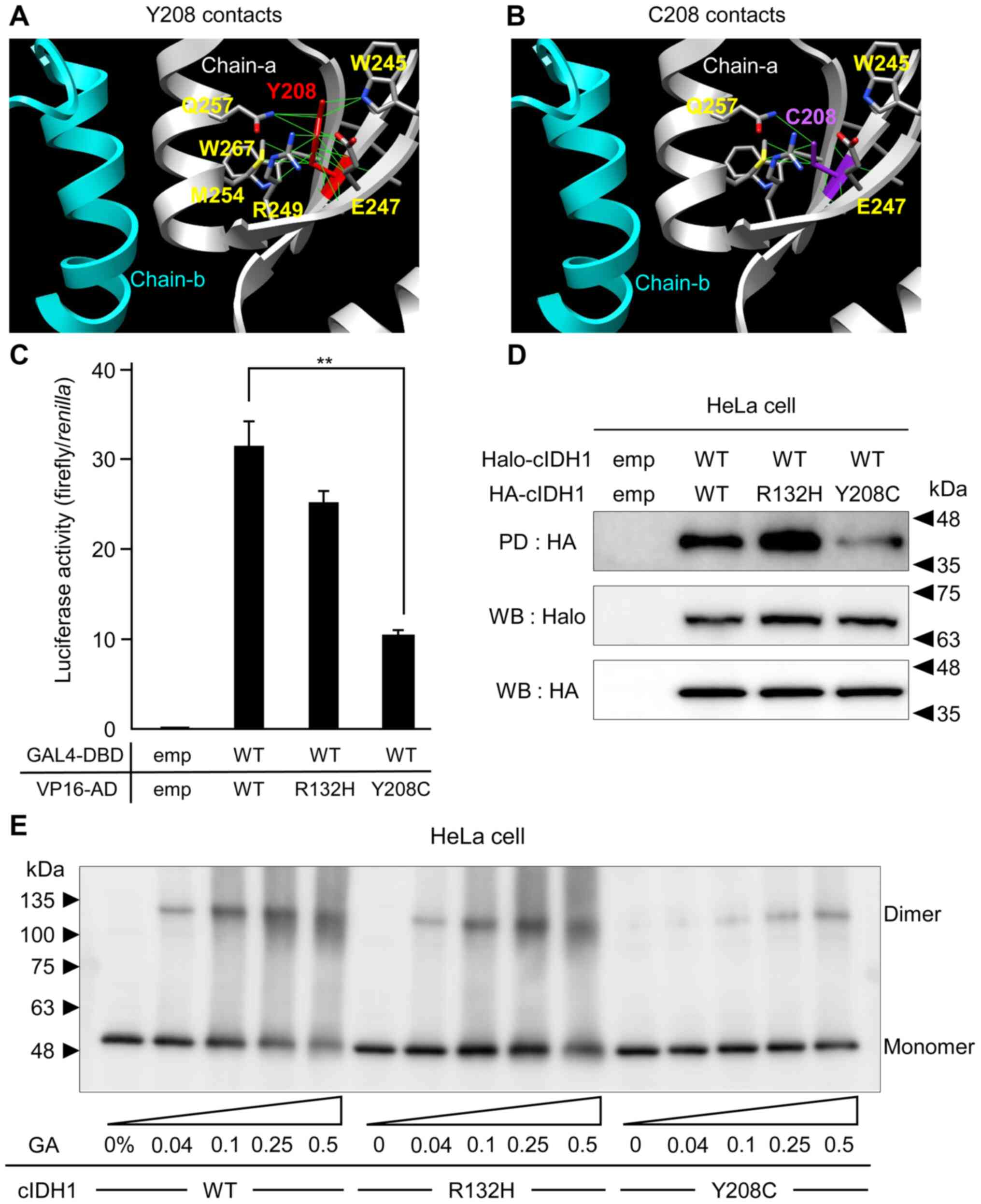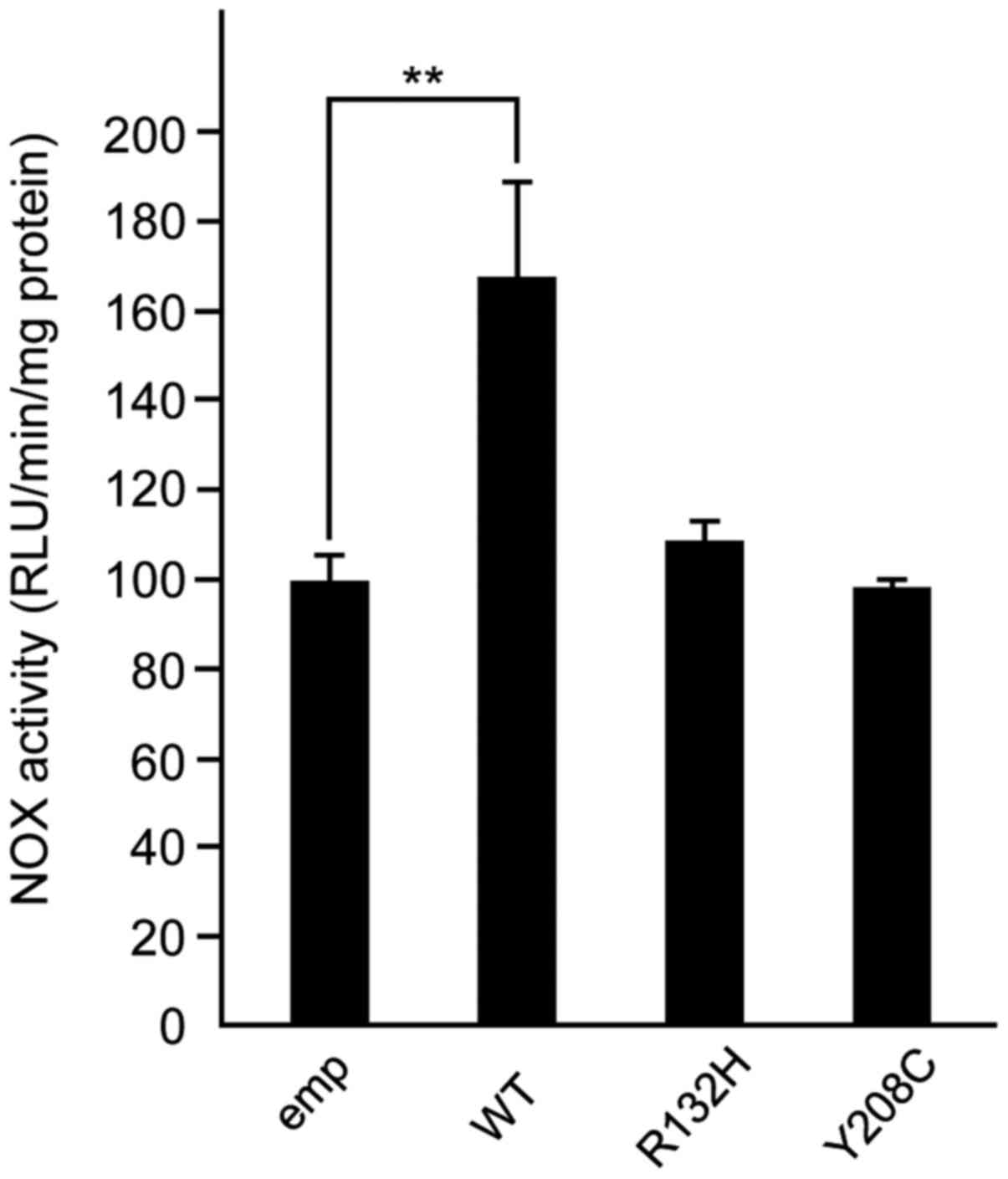|
1
|
Sahm F, Reuss D, Koelsche C, Capper D,
Schittenhelm J, Heim S, Jones DT, Pfister SM, Herold-Mende C, Wick
W, et al: Farewell to oligoastrocytoma: In situ molecular genetics
favor classification as either oligodendroglioma or astrocytoma.
Acta Neuropathol. 128:551–559. 2014. View Article : Google Scholar : PubMed/NCBI
|
|
2
|
Lapointe S, Perry A and Butowski NA:
Primary brain tumours in adults. Lancet. 392:432–446. 2018.
View Article : Google Scholar : PubMed/NCBI
|
|
3
|
Parsons DW, Jones S, Zhang X, Lin JC,
Leary RJ, Angenendt P, Mankoo P, Carter H, Siu IM, Gallia GL, et
al: An integrated genomic analysis of human glioblastoma
multiforme. Science. 321:1807–1812. 2008. View Article : Google Scholar : PubMed/NCBI
|
|
4
|
Reitman ZJ and Yan H: Isocitrate
dehydrogenase 1 and 2 mutations in cancer: Alterations at a
crossroads of cellular metabolism. J Natl Cancer Inst. 102:932–941.
2010. View Article : Google Scholar : PubMed/NCBI
|
|
5
|
Bleeker FE, Lamba S, Rodolfo M, Scarpa A,
Leenstra S, Vandertop WP and Bardelli A: Mutational profiling of
cancer candidate genes in glioblastoma, melanoma and pancreatic
carcinoma reveals a snapshot of their genomic landscapes. Hum
Mutat. 30:E451–E459. 2009. View Article : Google Scholar : PubMed/NCBI
|
|
6
|
Yan H, Parsons DW, Jin G, McLendon R,
Rasheed BA, Yuan W, Kos I, Batinic-Haberle I, Jones S, Riggins GJ,
et al: IDH1 and IDH2 mutations in gliomas. N Engl J Med.
360:765–773. 2009. View Article : Google Scholar : PubMed/NCBI
|
|
7
|
Mardis ER, Ding L, Dooling DJ, Larson DE,
McLellan MD, Chen K, Koboldt DC, Fulton RS, Delehaunty KD, McGrath
SD, et al: Recurring mutations found by sequencing an acute myeloid
leukemia genome. N Engl J Med. 361:1058–1066. 2009. View Article : Google Scholar : PubMed/NCBI
|
|
8
|
Lugowska I, Teterycz P, Mikula M, Kulecka
M, Kluska A, Balabas A, Piatkowska M, Wagrodzki M, Pienkowski A,
Rutkowski P and Ostrowski J: IDH1/2 mutations predict shorter
survival in chondrosarcoma. J Cancer. 9:998–1005. 2018. View Article : Google Scholar : PubMed/NCBI
|
|
9
|
Waitkus MS, Diplas BH and Yan H:
Biological role and therapeutic potential of IDH mutations in
cancer. Cancer Cell. 34:186–195. 2018. View Article : Google Scholar : PubMed/NCBI
|
|
10
|
Dang L, White DW, Gross S, Bennett BD,
Bittinger MA, Driggers EM, Fantin VR, Jang HG, Jin S, Keenan MC, et
al: Cancer-associated IDH1 mutations produce 2-hydroxyglutarate.
Nature. 462:739–744. 2009. View Article : Google Scholar : PubMed/NCBI
|
|
11
|
Gross S, Cairns RA, Minden MD, Driggers
EM, Bittinger MA, Jang HG, Sasaki M, Jin S, Schenkein DP, Su SM, et
al: Cancer-associated metabolite 2-hydroxyglutarate accumulates in
acute myelogenous leukemia with isocitrate dehydrogenase 1 and 2
mutations. J Exp Med. 207:339–344. 2010. View Article : Google Scholar : PubMed/NCBI
|
|
12
|
Schnittger S, Haferlach C, Ulke M,
Alpermann T, Kern W and Haferlach T: IDH1 mutations are detected in
6.6% of 1414 AML patients and are associated with intermediate risk
karyotype and unfavorable prognosis in adults younger than 60 years
and unmutated NPM1 status. Blood. 116:5486–5496. 2010. View Article : Google Scholar : PubMed/NCBI
|
|
13
|
Wajner M, Latini A, Wyse AT and
Dutra-Filho CS: The role of oxidative damage in the neuropathology
of organic acidurias: insights from animal studies. J Inherit Metab
Dis. 27:427–448. 2004. View Article : Google Scholar : PubMed/NCBI
|
|
14
|
Zhao S, Lin Y, Xu W, Jiang W, Zha Z, Wang
P, Yu W, Li Z, Gong L, Peng Y, et al: Glioma-derived mutations in
IDH1 dominantly inhibit IDH1 catalytic activity and induce
HIF-1alpha. Science. 324:261–265. 2009. View Article : Google Scholar : PubMed/NCBI
|
|
15
|
Calvert AE, Chalastanis A, Wu Y, Hurley
LA, Kouri FM, Bi Y, Kachman M, May JL, Bartom E, Hua Y, et al:
Cancer-associated IDH1 promotes growth and resistance to targeted
therapies in the absence of mutation. Cell Rep. 19:1858–1873. 2017.
View Article : Google Scholar : PubMed/NCBI
|
|
16
|
Wahl DR, Dresser J, Wilder-Romans K,
Parsels JD, Zhao SG, Davis M, Zhao L, Kachman M, Wernisch S, Burant
CF, et al: Glioblastoma therapy can be augmented by targeting
IDH1-mediated NADPH biosynthesis. Cancer Res. 77:960–970. 2017.
View Article : Google Scholar : PubMed/NCBI
|
|
17
|
Zarei M, Lal S, Parker SJ, Nevler A,
Vaziri-Gohar A, Dukleska K, Mambelli-Lisboa NC, Moffat C, Blanco
FF, Chand SN, et al: Posttranscriptional upregulation of IDH1 by
HuR establishes a powerful survival phenotype in pancreatic cancer
cells. Cancer Res. 77:4460–4471. 2017. View Article : Google Scholar : PubMed/NCBI
|
|
18
|
Dobson JM, Samuel S, Milstein H, Rogers K
and Wood JL: Canine neoplasia in the UK: Estimates of incidence
rates from a population of insured dogs. J Small Anim Pract.
43:240–246. 2002. View Article : Google Scholar : PubMed/NCBI
|
|
19
|
Reitman ZJ, Olby NJ, Mariani CL, Thomas R,
Breen M, Bigner DD, McLendon RE and Yan H: IDH1 and IDH2 hotspot
mutations are not found in canine glioma. Int J Cancer.
127:245–246. 2010. View Article : Google Scholar : PubMed/NCBI
|
|
20
|
Kawakami S, Ochiai K, Azakami D, Kato Y,
Michishita M, Morimatsu M, Ishiguro-Oonuma T, Onozawa E, Watanabe M
and Omi T: R132 mutations in canine isocitrate dehydrogenase 1
(IDH1) lead to functional changes. Vet Res Commun. 42:49–56. 2018.
View Article : Google Scholar : PubMed/NCBI
|
|
21
|
Kaneko MK, Tian W, Takano S, Suzuki H,
Sawa Y, Hozumi Y, Goto K, Yamazaki K, Kitanaka C and Kato Y:
Establishment of a novel monoclonal antibody SMab-1 specific for
IDH1-R132S mutation. Biochem Biophys Res Commun. 406:608–613. 2011.
View Article : Google Scholar : PubMed/NCBI
|
|
22
|
Kato Y: Specific monoclonal antibodies
against IDH1/2 mutations as diagnostic tools for gliomas. Brain
Tumor Pathol. 32:3–11. 2015. View Article : Google Scholar : PubMed/NCBI
|
|
23
|
Amin SB, Anderson KJ, Boudreau CE,
Martinez-Ledesma E, Kocakavuk E, Johnson KC, Barthel FP, Varn FS,
Kassab C, Ling X, et al: Comparative molecular life history of
spontaneous canine and human gliomas. Cancer Cell. 37:243–257.e7.
2020. View Article : Google Scholar : PubMed/NCBI
|
|
24
|
Misdorp W, Else RW, Hellmen E and Lipscomb
TP: Histological classification of mammary tumors of the dog and
the cat. World Health Organization International Histological
Classification of Tumors of Domestic Animals. Schulman FY: 7. 2nd
Series. Armed Forces Institute of Pathology; Washington, DC: pp.
581999
|
|
25
|
Pettersen EF, Goddard TD, Huang CC, Couch
GS, Greenblatt DM, Meng EC and Ferrin TE: UCSF Chimera-a
visualization system for exploratory research and analysis. J
Comput Chem. 25:1605–1612. 2004. View Article : Google Scholar : PubMed/NCBI
|
|
26
|
Jalil JE, Perez A, Ocaranza MP, Bargetto
J, Galaz A and Lavandero S: Increased aortic NADPH oxidase activity
in rats with genetically high angiotensin-converting enzyme levels.
Hypertension. 46:1362–1367. 2005. View Article : Google Scholar : PubMed/NCBI
|
|
27
|
Emerling BM, Platanias LC, Black E,
Nebreda AR, Davis RJ and Chandel NS: Mitochondrial reactive oxygen
species activation of p38 mitogen-activated protein kinase is
required for hypoxia signaling. Mol Cell Biol. 25:4853–4862. 2005.
View Article : Google Scholar : PubMed/NCBI
|
|
28
|
Preusser M, Wohrer A, Stary S, Hoftberger
R, Streubel B and Hainfellner JA: Value and limitations of
immunohistochemistry and gene sequencing for detection of the
IDH1-R132H mutation in diffuse glioma biopsy specimens. J
Neuropathol Exp Neurol. 70:715–723. 2011. View Article : Google Scholar : PubMed/NCBI
|
|
29
|
Ashraf S, Noguera NI, Di Giandomenico J,
Zaza S, Hasan SK and Lo-Coco F: Rapid detection of IDH2 (R140Q and
R172K) mutations in acute myeloid leukemia. Ann Hematol.
92:1319–1323. 2013. View Article : Google Scholar : PubMed/NCBI
|
|
30
|
Catteau A, Girardi H, Monville F,
Poggionovo C, Carpentier S, Frayssinet V, Voss J, Jenkins R,
Boisselier B, Mokhtari K, et al: A new sensitive PCR assay for
one-step detection of 12 IDH1/2 mutations in glioma. Acta
Neuropathol Commun. 2:582014. View Article : Google Scholar : PubMed/NCBI
|
|
31
|
Truve K, Dickinson P, Xiong A, York D,
Jayashankar K, Pielberg G, Koltookian M, Muren E, Fuxelius HH,
Weishaupt H, et al: Utilizing the dog genome in the search for
novel candidate genes involved in glioma development-genome wide
association mapping followed by targeted massive parallel
sequencing identifies a strongly associated locus. PLoS Genet.
12:e10060002016. View Article : Google Scholar : PubMed/NCBI
|
|
32
|
Tate JG, Bamford S, Jubb HC, Sondka Z,
Beare DM, Bindal N, Boutselakis H, Cole CG, Creatore C, Dawson E,
et al: COSMIC: The catalogue of somatic mutations in cancer.
Nucleic Acids Res. 47:D941–D947. 2019. View Article : Google Scholar : PubMed/NCBI
|
|
33
|
Huang LE: Friend or foe-IDH1 mutations in
glioma 10 years on. Carcinogenesis. 40:1299–1307. 2019. View Article : Google Scholar : PubMed/NCBI
|
|
34
|
Koyasu S, Shimizu Y, Morinibu A, Saga T,
Nakamoto Y, Togashi K and Harada H: Increased
14C-acetate accumulation in IDH-mutated human
glioblastoma: Implications for detecting IDH-mutated glioblastoma
with 11C-acetate PET imaging. J Neuro Oncol.
145:441–447. 2019. View Article : Google Scholar
|
|
35
|
Zhao S and Guan KL: IDH1 mutant structures
reveal a mechanism of dominant inhibition. Cell Res. 20:1279–1281.
2010. View Article : Google Scholar : PubMed/NCBI
|
|
36
|
Vinekar R, Verma C and Ghosh I: Functional
relevance of dynamic properties of Dimeric NADP-dependent
isocitrate dehydrogenases. BMC Bioinformatics. 13 (Suppl
17):S22012. View Article : Google Scholar : PubMed/NCBI
|


















